On September 16, Scott Morrison heralded the dawn of a momentous new alliance with our “forever friends”, the USA and Great Britain.
Lovers of Scrabble were thrilled to witness the birth of a freshly minted word – AUKUS, but the finer details of this partnership were conspicuously absent, much like French diplomats on Australian soil. But it appears that a prophesy attributed to another Frenchman, Le Empereur himself, is starting to come true – China the sleeping giant, has risen from her slumber and she is starting to shake the world…
AT A GLANCE
- China’s increasingly belligerent behaviour is a threat to world security.
- To contain China, the West first needs to understand the Chinese psyche.
- What can Australia learn from India’s experiences with its giant northern neighbour?
World history, as we know it in Australia, has predominantly been taught from a Western perspective. We are familiar with the greatness of ancient Greece and Rome but remain largely ignorant of the magnificence of other ancient civilisations, especially those in our own backyard such as India and China. Most Australians could easily rattle off the names of at least ten large cities in the USA. India and China have more than 2 dozen cities each, that have a population larger than either of Brisbane or Boston, but few Australians would be able to name even 10 of these!
Similarly, we have been made aware of the horrors of the Holocaust, but remain mostly ignorant of the destruction unleased on China by the Japanese during World War 2, as well as earlier ignominies by the British during the Opium Wars. As a result, the Chinese intelligentsia has borne a resentment towards Japan and the West since the inception of the People’s Republic of China in 1949. India on the other hand, has little residual resentment towards the West, despite the millions of deaths suffered during the partition or the famine of Bengal – disasters that could have been largely averted by the British. China’s rampant nationalism has been fuelled by these past travesties but more so by the steroids of its newly acquired economic wealth. It has taken on the mantle of the regional bully, utilising commercial and political intimidation to achieve its belligerent geo-strategic aims.
China continues to have border disagreements with almost all its 14 neighbours, most notably its long standing unresolved territorial dispute with India. It’s dismal environmental and human rights records, and genocidal treatment of large minorities such as the Tibetans and Uyghurs have largely been ignored by the West. In a dark masterstroke worth of Sun Tzu himself, China has strategically boxed-in its main Asian rivals – Japan and India, by providing nuclear weapons and missile technologies to two of its unstable proxy states – North Korea and Pakistan respectively.
Such transgressions by lesser powers normally result in harsh economic and political sanctions, such as those imposed by the West on India in 1998, post Pokhran. But China continues to act with impunity, cognisant that its economic rise has greatly benefited the West’s own commercial interests. Hence, strongman Xi Jinping has ratcheted up the ante – his staggeringly ambitious One Belt, One Road project, has intentionally ruptured the economies of several African and Asian nations, forcing them to swap valuable assets in exchange for bad debts; anchoring them to China’s growing orbit of influence.
Ironically, Australia’s new alliance with its “forever friends”, the USA and Great Britain – countries with whom we share a common language and culture – is squarely aimed at countering China, our largest trading partner and one that poses us no direct military threat!
History dictates that nothing is forever, except perhaps a country’s geography. Hence, Australia’s future history should be defined primarily by economic and geographical imperatives. Geography dictates that the Australian continent is merely a large offshoot of the Asian land mass, a fact that continues to cause a degree of discomfort amongst certain sections of the Australian establishment.
Historically, India and China have been the world’s foremost powers for almost two millennia from the 1st to the 18th Centuries, and China now appears to be intent on fulfilling what it believes to be its destiny – to dominate world affairs. Scott Morrison’s proud announcement regarding the acquisition of a small US designed nuclear-powered (but conventionally armed!) submarine fleet, will therefore cause little loss of sleep in Beijing.
Rather than volunteering to be in the vanguard of yet another American led confrontation, it may be wiser for Australia as a mature middle power to follow India’s lead and hedge its strategic bets, by not placing all its defence eggs into the AUKUS basket. India is acutely aware that along with a large military force, home grown expertise in cyber security and satellite technology are also vital defences against hostile neighbours. Now more than ever, Australia needs to recognise that its future lies with Asia and that ramping up relations with India will be of significant mutual benefit. It’s time for Australia, long seen by our neighbours as “the white man in Asia”, to take back the control of its own defence, rather than outsourcing it on a permanent basis, to its Western “forever friends” across the seas.
READ ALSO: Forget China. India is our future
Link up with us!
Indian Link News website: Save our website as a bookmark
Indian Link E-Newsletter: Subscribe to our weekly e-newsletter
Indian Link Newspaper: Click here to read our e-paper
Indian Link app: Download our app from Apple’s App Store or Google Play and subscribe to the alerts
Facebook: facebook.com/IndianLinkAustralia
Twitter: @indian_link
Instagram: @indianlink
LinkedIn: linkedin.com/IndianLinkMediaGroup




